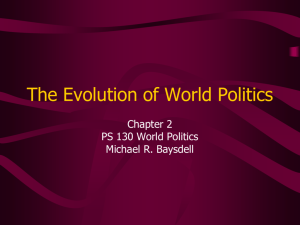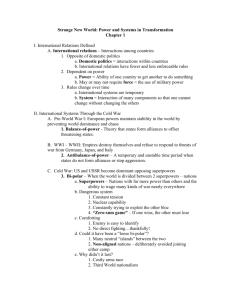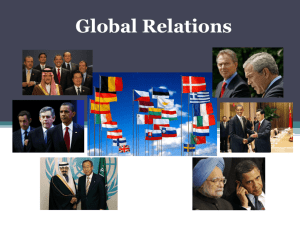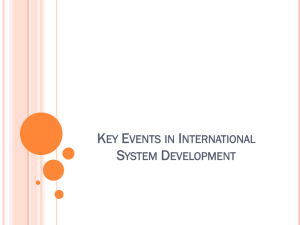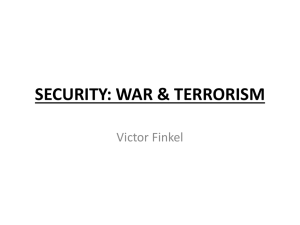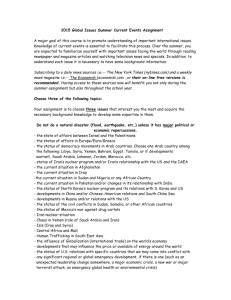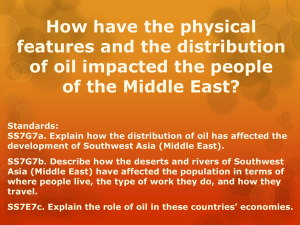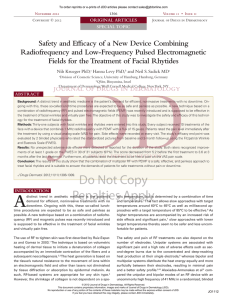Introduction to International Relations
advertisement
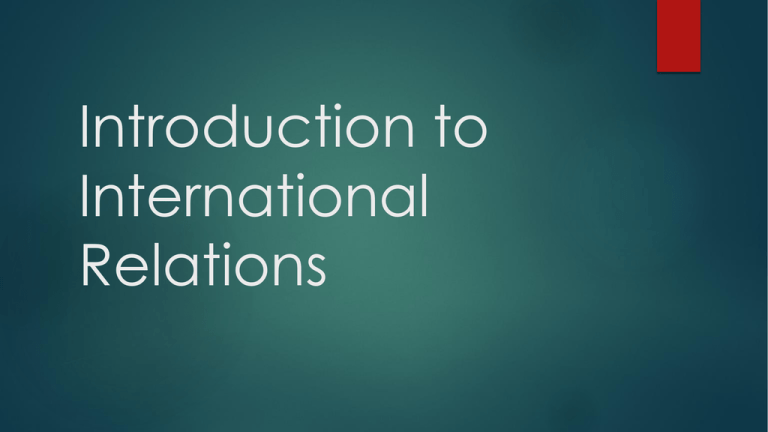
Introduction to International Relations WHAT DOES INTERNATIONAL RELATIONS MEAN? International Relations International Relations (IR) is the interaction among countries. IR depends a lot on power, the ability of one country to get another to do (or sometimes not do) something. The United States and sometimes Russia are two of the major superpowers that use power to get other countries to do something. Cold War Era Using Power in IR Countries acquire international power through wealth and bullying smaller countries through military intimidation. Using Power in IR Some order grows out of relative power amongst nations. During the 19th Century, the British Empire arranged much of the globe to its liking, and small, weak lands largely obeyed. Such power relationships create international systems, the way power is distributed around the globe. IR systems always change If one country has overwhelming power, enough to supervise the globe (unlikely), it might be a unipolar system. Unipolar country The system: World led by one sovereign world during the 20th century has witnessed four IR systems. 1. Pre-World War I Dominance of the Great European empires in the 19th century until 1914. In system theory, this period represents a balance-of-power system, but by 1910 it has decayed. 2. World War I through World War 2 The empires destroy themselves from 19141945. With the major countries not willing to respond to threats, this period is termed “antibalance-of-power” system. These systems are stable and temporary. 3. Cold War The collapse of the traditional European powers leaves the U.S. and the USSR facing each other in a bipolar system (two country system). The superpowers block and exhaust themselves from 1945 through the 1980s, and the bipolar system falls apart. 4. Post-Cold War The collapse of the Soviet Union end bipolarity, which leaves the world in a disputed era. Current theories range from multipolar (several power centers) to zones of chaos and from globalization (interlocked world) to clash of civilizations. Remember…. We do not live in a perfect neat world where we could put every world issue in a neat pile. Same thing goes with IR. Systems Treating can overlap. Iraq and Afghanistan as Cold War battles, has made new generations of enemies (ISIS). What kind of New System Will We See? The collapse of the Soviet Union in 1991 has raised the question of what system theory are we living in. There are seven possible theories. Multipolar? The most accepted model sees the world as multipolar. A system of several centers of power, some of them trading blocs and all of them engaged in tough economic competition. Multipolar would somewhat resemble the old balance-of-power system, but the blocs and major nations do not form new alliances. Instead, they focus on their economies, and economic growth becomes their main task in order to gain power and respect. Multipolar? This model does not fit reality perfectly. The blocs (the European Union, the Pacific Rim, and others), cannot look after their own security; all need U.S. help. Western Europe asked for U.S. help during the Yugoslavian uprising. South Korea, Taiwan, and Japan are powerful trade competitors with the U.S. but all want free security from America. Multipolar? Many theorist believe that the United States controls the world because of its military. Without U.S. leadership in the world, little gets done. If trade disputes become too great, a multipolar system would break down into something else, perhaps a “resource war” system. Unipolar? The world dominated by one power center. In this picture, the United States would lead in constructing what President Bush senior called a “new world order”. The U.S. leads the United Nations and the middle-sized powers to stop an aggressor. New World Order Highlights https://www.youtube.com/watch?v=MADYzQstpsU Unipolar? Would the world unite and fight back against the unipolar power? Bush administration adopted the unipolar view of the world and tried to implement it in Afghanistan in 2001 and in Iraq in 2003. Counterweight? As Bush 43 pursued a unipolar model, many European lands, Russia, China, and others countries spoke of a “counterweight” to U.S. powers. They saw the U.S. as dominating and too eager for war. Here, instead of following the U.S., many other nations agree among themselves to ignore or oppose the U.S. In reaction to U.S. policy on Iraq, the world tend to form a counterweight, such as Russia and China. Stratified? A stratified model combines the unipolar and multipolar models may fit reality better. Power 1st distributed by layers. layer: The rich high-tech countries. 2nd layer: Rapidly industrializing lands such as China, India, and Brazil. 3rd layer: “Zone of chaos” dominated by crime, warlords, and instability. (Middle East, Africa, Central America, Southern Asia) Stratified? Many of the world’s natural resources (particularly oil) are in these chaotic zones, so the first layer is inevitably drawn into their difficulties. Rich countries will like to keep these countries chaotic in order to have an excuse to intervene. U.S.-China Duopoly? Two big powers dominate. The G-2 (Group of 2) indicating they are the only two that really count now. In UN and in G8 and G20 meetings. This theory is being proven wrong. China concentrates on its own economic growth and avoids global problems such as nuclear proliferation, peacekeeping, currency parties, and climate change. (Isolationism) Globalized? The world turning into one big capitalist market. Most countries become economic players in the world market, a capitalist competition where goods, money, and ideas flow easily to wherever there are costumers. The motto of a globalized system: “Make money, not war.” Globalized? Problems with a globalized system: If one of the major countries falls into a recession or a depression, it will disrupt the world’s economy. Rich War will take advantage of poor countries. could lead to blockades and the cancelation of business between countries. Resource Wars? Some researchers warn we are moving into an “age of scarcity” marked by a scramble for natural resources, especially petroleum. We might already be engaged in resources wars: the 1991 and 2003 wars in Iraq. War over oil? War over water? War over land if seas rise? Clash of Civilizations? The biggest threat: Islamic extremist vs. the West, Slavic/Orthodox, and Hindu Civilizations. Saudi Arabia and Iran, which both detested Saddam’s dictatorship in Iraq, opposed the 2003 U.S. invasion. Pakistan felt the same way about the Afghanistan invasion. One should not invade a brother Muslim country. Question: Which, if any, of these models matches and explains international relations today? Could a combination provide a better fit? Explain your answer. (2 paragraphs) Is Sovereignty Slipping? The authority of a state to govern itself. Being the boss on your own turf. Sovereignty has always partly fictional. Big, rich, and powerful countries routinely influence and even dominate small, poor, and weak countries. (Become their puppets) Is Sovereignty Slipping? The United Nations has told Iran that they can’t develop nuclear weapons (Iran not the boss on their own turf). But the world didn’t interfere in the massacre of 800,000 Rwandans in 1994. Why interfere in Iran and not Rwanda? Did a major power have something to gain in Rwanda? Is Sovereignty Slipping? The European Union (EU) is now one giant economic market, and many important decisions are made in Brussels headquarters, not in it members’ capitals. EU members have surrendered some of their sovereignty to a higher body. Many have given up control of their own currency to the Euro. EU is trying to build common foreign and defense policies. Blue Gold: World Water Wars https://www.youtube.com/watch?v=NHWqLrMI_iI
